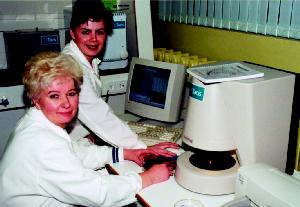| 2002 |

|
YEAR BOOK |
QUEEN�S UNIVERSITY BELFAST & THE DEPARTMENT OF AGRICULTURE AND RURAL DEVELOPMENT (NI)
|
Improving milk quality in St Petersburg, Russia
|

One of the most obvious problems was the lack of analytical quality assurance and independently verified analyses in the milk sector. Our primary input was advising on the establishment of an independent reference laboratory (IRL) for milk quality (chemical and microbiological) and the equipping of both the IRL and also on-farm mini-laboratories to perform a range of tests. The farm mini-laboratories were equipped with Russian-built rapid analysers (Laktan) for fat, protein etc., and a somatic cell counter (Somatos). The IRL, in addition to the Russian equipment, was equipped with a Lactoscope to determine fat, etc., and was also equipped to determine protein by the Kjeldahl method. A Protocol instrument for performing total bacterial counts was supplied. The IRL was seen as having a multifunctional role in improving milk quality in St Petersburg.
The milk processors in St Petersburg paid the farms on the basis of milk quality as determined by the processors. This was a potential source of disagreement and open to abuse. The IRL was seen as having an important role in arbitration between producer and processor. A second major role for the IRL was the establishment of a proficiency testing scheme (PTS) for all the farm mini-laboratories and the major processors � e.g. Petmol. This PTS, together with the introduction of instrumental analysis, would have the benefit of encouraging improved analytical quality control on farm and in the dairy laboratories, and assist in reducing the number of disagreements � e.g. regarding protein estimation.
The operation of the farm mini-laboratories should reduce the incidence of poor quality milk being supplied to the processor, thereby improving the quality of milk and milk products available to the consumer. This would also reduce the frequency of disputes between farm and dairy. This project has already had an impact with the local authorities recently introducing an extra category of milk quality.
Contact: [email protected]